Hublot Big Bang Tourbillon Automatic Purple Sapphire: Sapphire Has Found Its King
13 June 2022Flemish actor Gerd de Ley loves aphorisms. In one of these he writes that “transparency is the custody of wisdom.” If he had seen Hublot’s new Big Bang Tourbillon Automatic Purple Sapphire, he would have written that transparency is the custody of excellence.
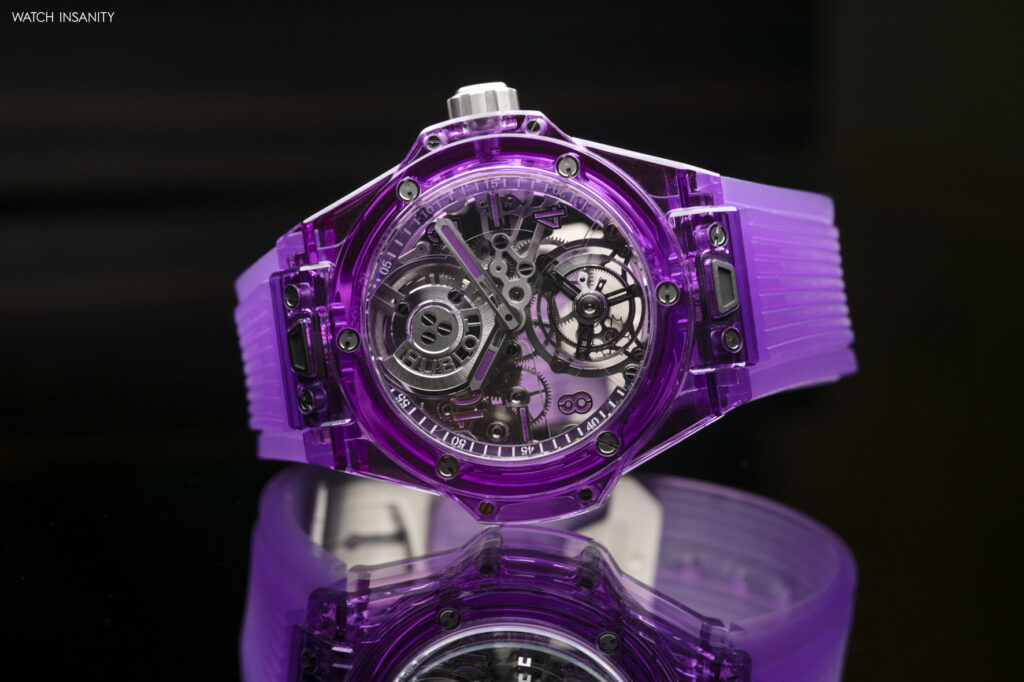
The watch was among the stars of the latest Watches and Wonders show – and not only in the Hublot assortment. The reason is clear: few other pieces embody such a high level of engineering and technological excellence. The Big Bang Tourbillon Automatic Purple Sapphire is a mix of cutting-edge materials and superior mechanics, paired with a hue that, throughout history, has been that of kings and emperors. For this reason, it perfectly matches the watch case, and is a world first.
THE ORIGINS OF THE BIG BANG TOURBILLON AUTOMATIC PURPLE SAPPHIRE
In watchmaking, purple (or translucent purple, as Hublot calls it) is not something you see every day, what’s more combined with sapphire, a modern and surprising material. A material that Hublot masters at the highest levels of workmanship, probably unattainable levels for today. The brand’s experience in treating sapphire to give it the most functional shape for the needs of the watch comes from afar and has led, over the years, to the creation of memorable references.

Big Bang Unico Sapphire, All Black Sapphire, Big Bang Unico Red Sapphire and Blue Sapphire, Spirit of Big Bang Yellow Sapphire, up to the last Big Bang Tourbillon Automatic Orange Sapphire: they are the steps that led to the Big Bang Tourbillon Automatic Purple Sapphire.
HUBLOT AND THE SAPPHIRE CHALLENGE
Processing sapphire is something tremendously difficult and expensive. If, in addition to having to work with it, one is also constantly looking for new colors to apply to it, the task becomes, if not impossible, certainly challenging.
Sapphire crystal can’t be found in nature: it’s a synthetic corundum created in laboratory. Corundum is a mineral based on aluminum oxyde, in crystalline form, whose color depends on the impurities it contains: Hublot’s new purple tint is a composite made of aluminium oxyde and chrome.
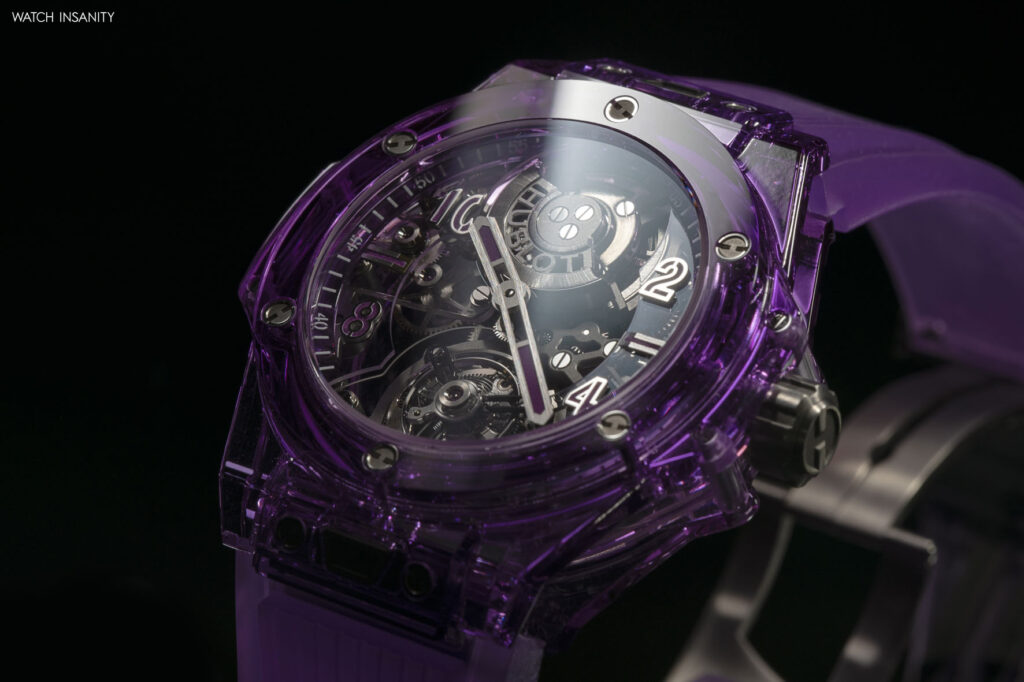
The basic technique for creating it in the laboratory comes from the late 19th century, when the French chemist Auguste Verneuil devised the process that bears his name, also known as flame fusion. The process involves the fusion of a finely pulverized substance using a blowtorch and its crystallization in a boule of dissolved droplets, which are the product of heating.
The evolution of the technique has led the watchmaking industry to develop high pressure and very high temperature processes, to produce cylindrical blocks of useful dimensions to create not only the cases, but also smaller watch components such as bezels and bracelet links. As in the case of some Hublot collections.
WHEN THE GOING GETS TOUGH…
The difficulty, however, is not so much in creating the synthetic sapphire (we had already succeeded more than a century ago) as it is in giving it the desired color, which won’t fade over time, and working with it. Sapphire has a nice characteristic for those who use it, less so for those who model it: it is very hard.
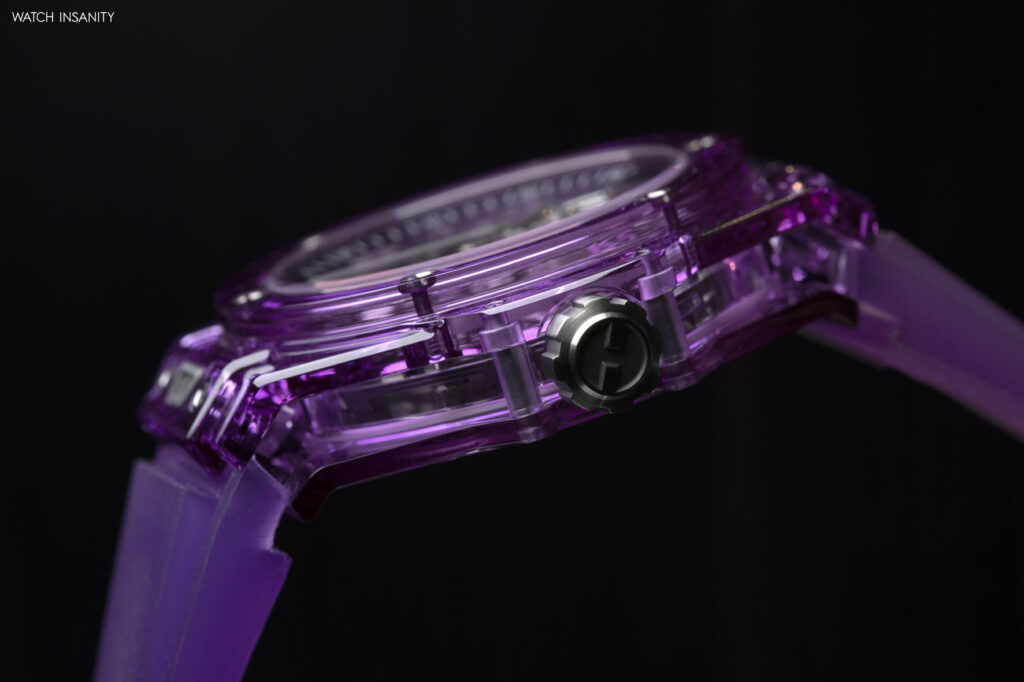
The sapphire cylinders created with the high pressure and temperature processes can be cut, machined, milled and turned only with grinding wheels or diamond-tipped tools: if the diamond’s hardness on the Mohs scale stands at 10, that of sapphire is at 9. In addition to being complex, these manufacturing processes are time-consuming and expensive. From all this you can easily see why watches with a sapphire case are particularly expensive.
Then, the color. To create and machine transparent sapphire is not easy, to give it the desired color is an almost alchemic work in balancing the various chemical elements. And this work, inevitably, does not lead to an immediate result. Trials and errors are inevitable, because the color must match a very specific shade, and above all it must remain stable over time, without fading or getting altered in any way.
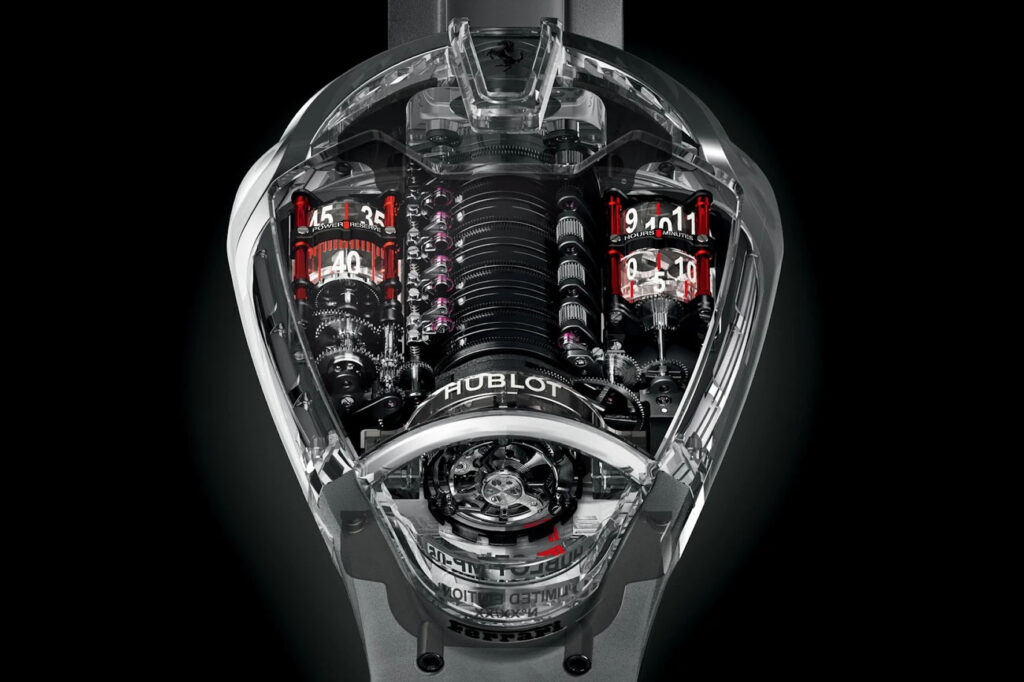
The Big Bang Tourbillon Automatic Purple Sapphire, with its 44mm diameter and 14.5mm thick case, is an abstract of all this – because it is today the highest point reached by Hublot in sapphire manufacturing. A story that began in 2016 with the MP5 La Ferrari Sapphire presented in Geneva, and the Big Bang Unico Sapphire featured at Baselworld.
BIG BANG TOURBILLON AUTOMATIC PURPLE SAPPHIRE: THE CALIBER
Such a plenty amount of avant-gardist features would be enough to conclude the article here, were it not for the fact that we are talking about watchmaking and a brand like Hublot, for which the exterior and interior have the same high level of dignity and the same quantity of innovative content. So let’s move on to the caliber.
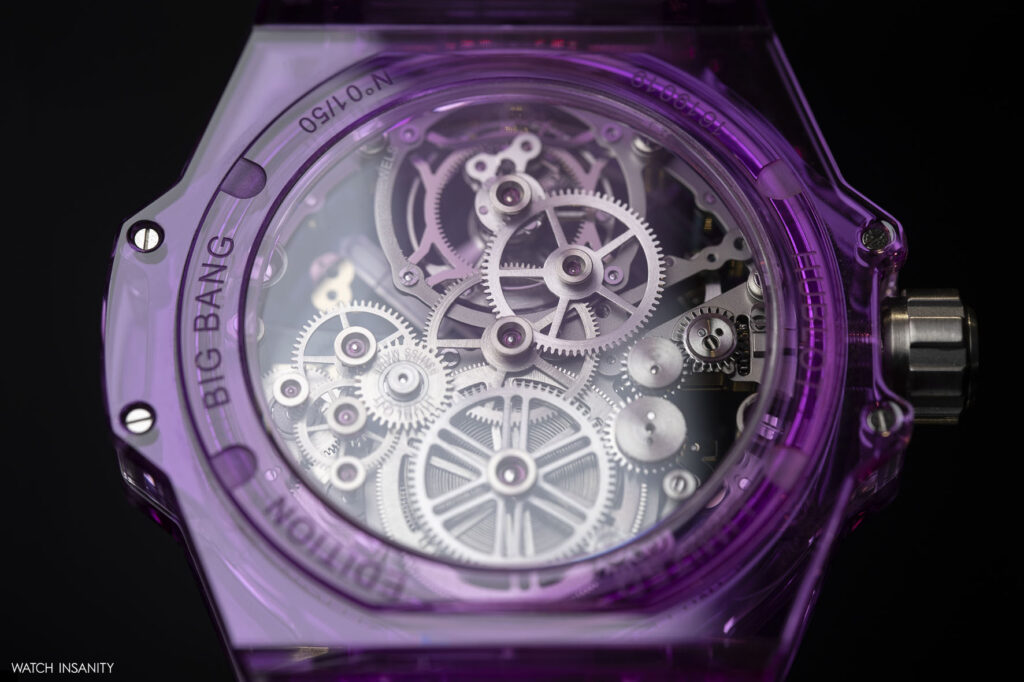
Hublot powers the Big Bang Tourbillon Automatic Purple Sapphire with its HUB6035 in-house automatic tourbillon movement. The view from the transparent case back is much more focused on the gear train than the sight on the dial side, which focuses on complications. The HUB6035 offers a solid 72-hour power reserve and runs at 21,600 vibrations/hour.
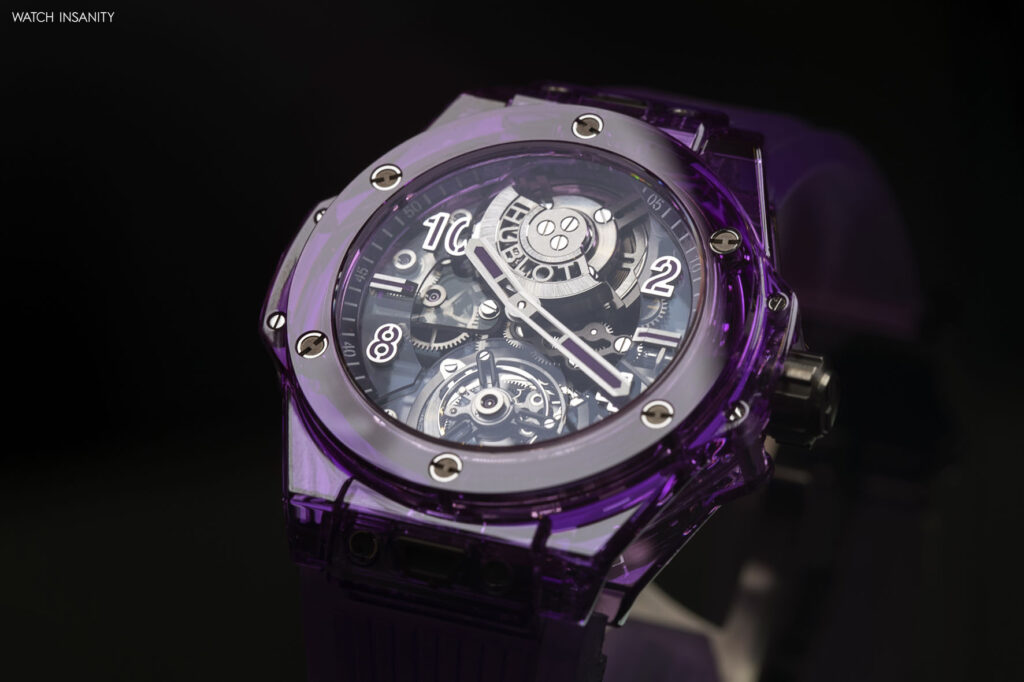
Its extremely essential design allows to see almost all the functional components of the movement, with the matt bridges contrasting with the radial satin finish of the wheels. The gear train and the open mainspring barrel at 12 o’clock are in plain sight, the latter with a particularly clever design. It is dominated by the Hublot skeletonized micro-rotor, mounted above the barrel to act both as a signature on the dial and as an element that visually counterbalances the tourbillon at 6 o’clock, both of the same proportions.
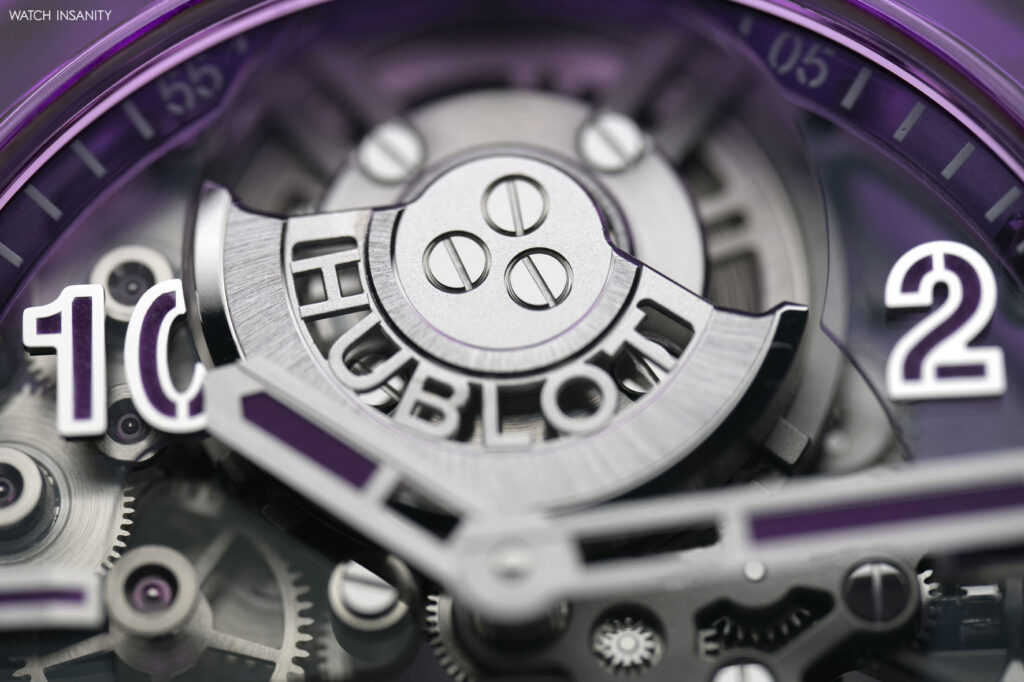
HIS MAJESTY THE TOURBILLON
Of course, the skeletonized design also frames the tourbillon, for which Hublot draws on its fifteen years of developing this complication. The first was launched in 2007, and on this tourbillon the automatic winding (the standard usually has manual winding) is entrusted to the micro-rotor at 12 o’clock, and is made more efficient by a system of ceramic ball bearings.
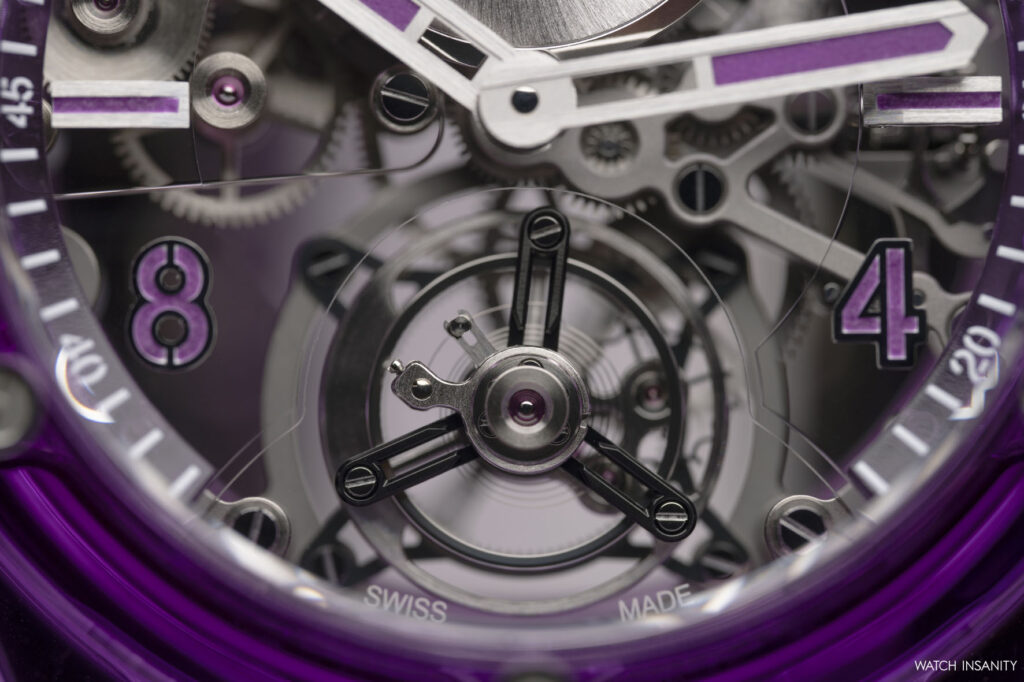
The tourbillon has a minimalist cage, which makes one full rotation in one minute and which matches the aggressive skeletonization of the rest of the movement, allowing an almost unobstructed view of its internal mechanism. The in-depth vision does not affect the legibility of the open dial, which is enhanced by the hands and hour markers highlighted by a luminescent coating.
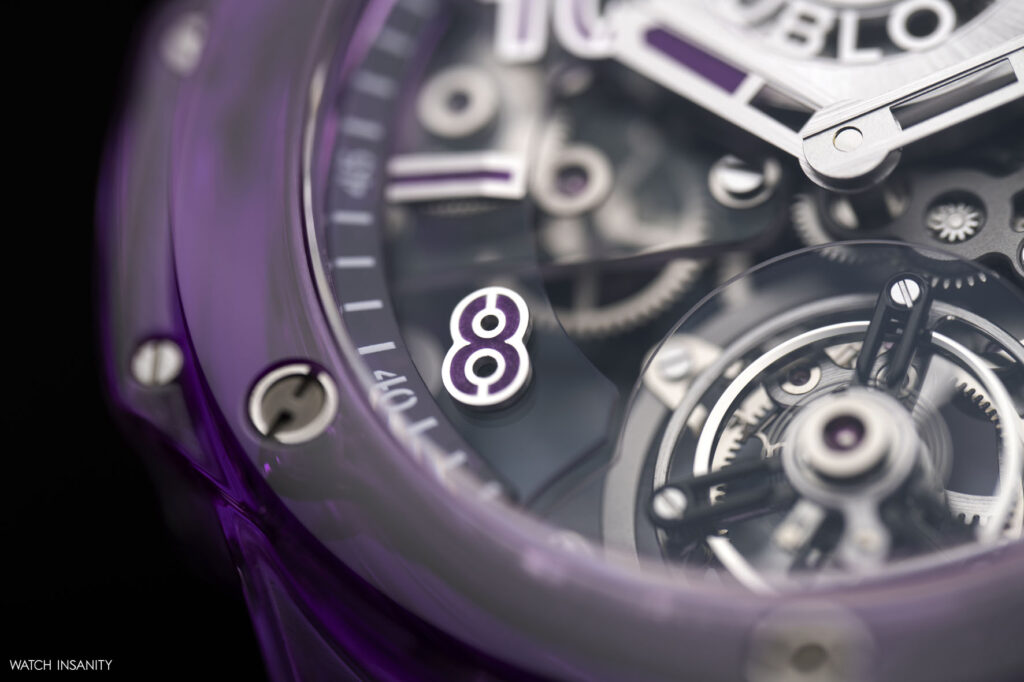
PURPLE IN LIMITED EDITION
In addition to the case, transparent purple is also found on the Big Bang Tourbillon Automatic Purple Sapphire’s bezel, fixed to the middle case by the classic H-shaped titanium screws, as well as on the transparent purple rubber strap with lined relief. It can be easily replaced thanks to the patented One Click quick change system. No sapphire for the buckle, just titanium.
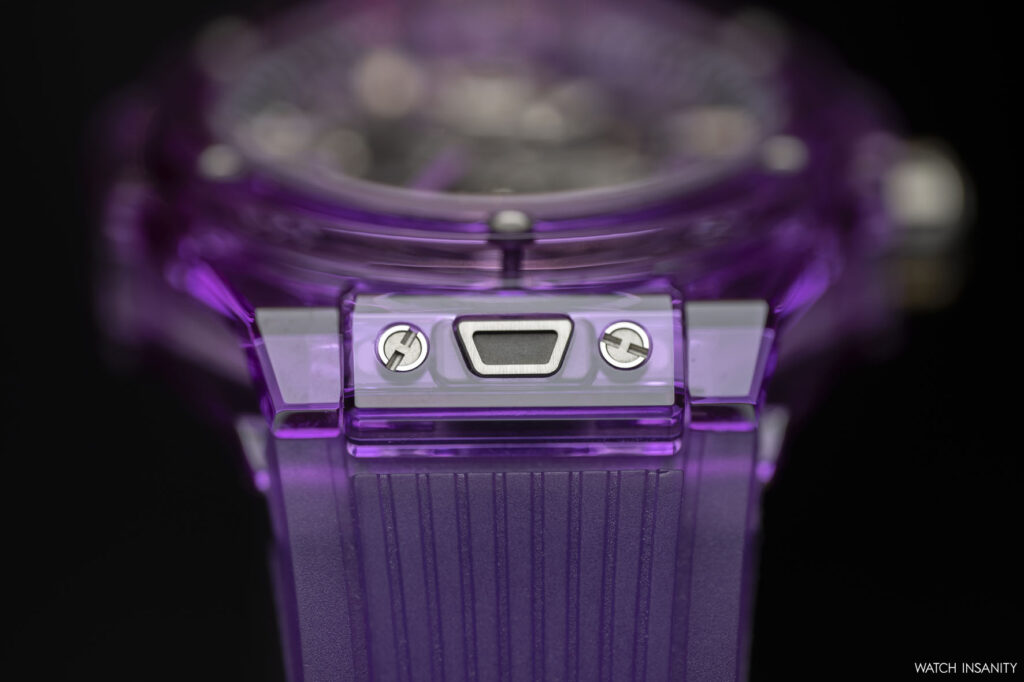
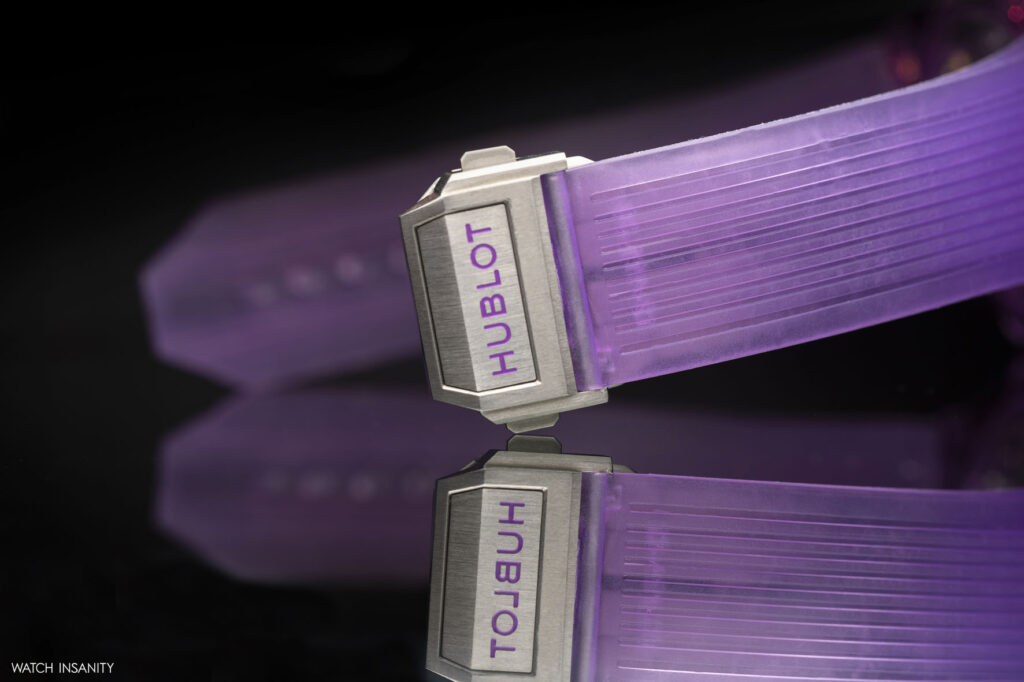
A watch like this could only be made in a limited edition of just 50 pieces, each for 198,000 euros. After all, excellence has its price, especially if it is not born overnight but it comes from years of research, innovation and experience. And so, to Hublot we say: chapeau!
By Davide Passoni
